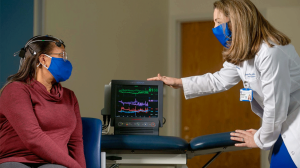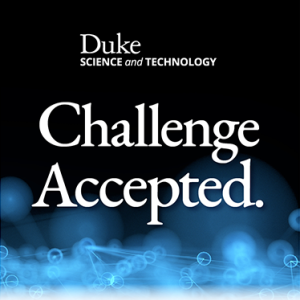Harnessing the Body’s Ability to Heal Itself
What if we could disable the defense mechanisms that enable cancer cells to evade treatment, or even control their genes to prevent them from developing into tumors in the first place? Can we enhance our brain’s ability to forestall damage from Alzheimer’s disease and other neurodegenerative conditions? Is it possible to develop a vaccine for everything?
These are among the questions driving a new multidisciplinary research effort at Duke University School of Medicine aimed at harnessing the innate processes the human body uses to prevent and heal disease. Body and Brain Resilience is one of the pillars of Duke Science and Technology (DST), a signature university-wide effort to elevate and sustain excellence in the sciences with new funding for research, recruitment of nationally recognized scholars, and retainment of scientific stars at Duke.
Launched with an initial $50 million investment from The Duke Endowment — divided equally between the university and the School of Medicine — DST positions Duke to maximize the potential resulting from revolutionary advances in fields such as genomics, data science, and artificial intelligence.
DST focuses on three broad thematic pillars, building on the foundation of research already done at Duke and spurring new projects and ideas: in addition to Body and Brain Resilience, the other two are Computing, involving fields such as artificial intelligence and machine learning; and Materials Science, which seeks to engineer new materials to solve challenges in areas including health care, energy, transportation, and electronics.
While the School of Medicine will touch on all three areas—artificial intelligence applications in health care, for example, or the development of biomaterials that mimic human tissue—its primary DST responsibility is to advance the Body and Brain Resilience research pillar.
In this context, “resilience” refers to the remarkable intrinsic mechanisms within the human body that prevent and repair damage and disease, such as the immune response that targets and destroys pathogens, or the capacity of brain cells to regenerate after a stroke. Research within the Body and Brain Resilience pillar of DST will seek to understand, harness, and strengthen these intrinsic mechanisms with increasing precision to prevent and treat disease.
“Resilience is the ability of a living entity—a person, an organ, a cell—to rebound from adversity,” said School of Medicine Dean Mary E. Klotman, MD. “We need to learn what it is that allows some individuals to recover from heart attack, stroke, and so on, while others don’t. The same is true at the cellular level: why do some cells survive adverse events, while others die? When we can isolate the factors that produce resilience, we can learn to enhance those factors and improve resilience. The concept of biologic resilience applies across so many systems and disease areas.”
The Body and Resilience pillar of DST will focus on basic and translational research in four primary areas where Duke has significant strengths: brain, cancer, immunology, and viruses and other pathogens.
“Many of the most transformative advances in medicine over the coming years are going to occur in these fields, and Duke is positioned to play a leading role,” said Colin S. Duckett, PhD, vice dean for basic science. “Duke Science and Technology will build on the work of the superb scientists and programs we already have in these areas. We want to focus our energy and efforts where Duke can make the biggest difference.”
DST Faculty Scholars
Key to DST’s success will be recruiting, retaining, and supporting exceptional faculty scientists in the relevant fields, and securing philanthropic support to fund those hires and research activities. Already more than 15 new top-tier faculty members, known as Duke Science and Technology Scholars, have been recruited. They are conducting advanced research across campus in specialty areas ranging from cybersecurity and insecticide resistance to immunology and deep brain stimulation.
At least five DST Scholars to date have appointments in the School of Medicine. They span specialties including neuroscience, immunology, pediatrics, and molecular genetics and microbiology, and conduct research in areas as disparate as gene editing, deep brain stimulation, and regenerative biology. Research in many of these fields will likely intersect, because one of the guiding principles of DST is innovative collaboration across disciplines.
“Our initial recruits are extraordinary in so many ways: not only in their science but in terms what kind of scientists and people they are,” said Klotman. “We look for superb scientists who embrace being part of a community and who want to do their part to help lift that whole community.”
The time is ripe for Duke to make this major commitment to breakthrough discovery in areas that will ultimately improve lives across the globe, said Duke University President Vincent E. Price. As the COVID-19 pandemic has made starkly clear, science holds the key to many of the greatest challenges the world faces. And as one of the world’s leading academic research institutions, Duke is positioned to take a prominent role in advancing knowledge and developing solutions.
“In this extraordinary moment, Duke and its supporters have a unique opportunity to truly change the world — to improve more lives through innovative therapies and a new understanding of human health,” Price said. “By further leveraging scientific advances and new technology, elevating the spirit of collaboration across our disciplines, and investing in transformative faculty to support our abiding commitments to teaching, discovery and patient care, we will rise together to meet the pressing problems of today and redefine what it means to be a research university for the future.”
To support research and learn more about Duke Science and Technology, visit dst.duke.edu or email scienceandtechnology@duke.edu.
The Future of Duke Science and Technology Begins With You
Duke Science and Technology is one of Duke’s biggest priorities. Your investment in our researchers, our students and our work will have exponential impact on society and our world.





